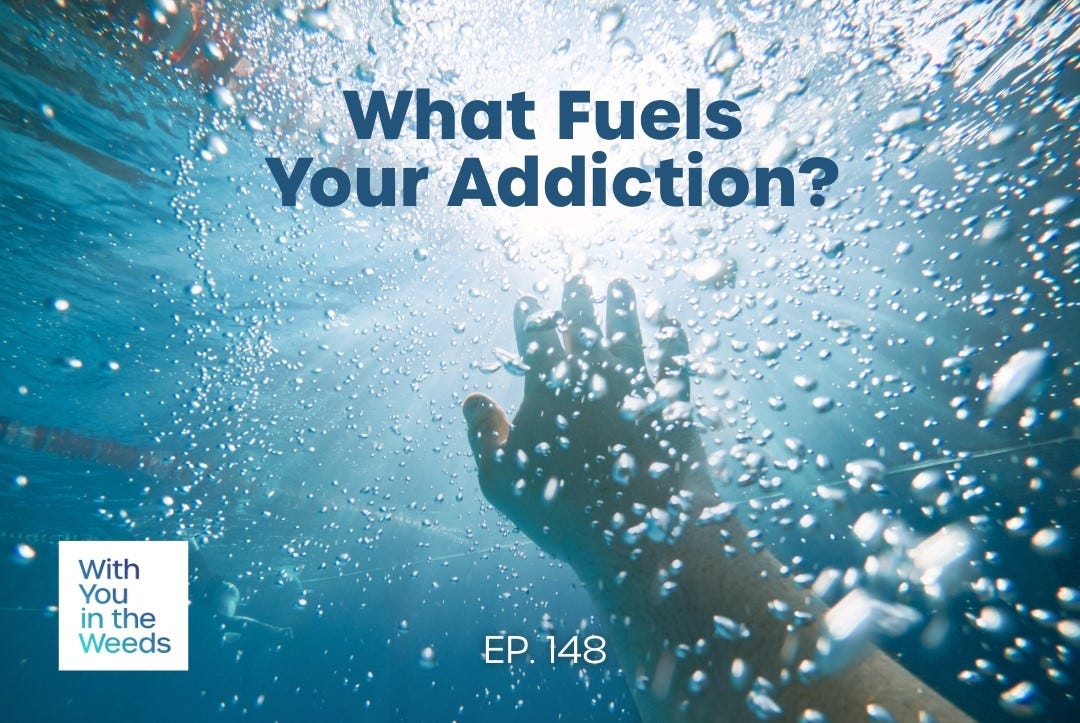What Fuels Your Addiction?
Understanding complex underlying causes
If you find yourself giving in to a sinister pull towards something harmful, you might be caught in addiction. And it won’t surprise you to learn that there are many currents contributing to what seems like an unchanging course towards disaster.
In the next episode of our new series, Dealing with Your Addictions, hosts Austin and John explore the 5 ‘rivers’ that fuel addiction. It turns out that a variety of different factors, some starting as early as infancy, can play a role in compulsive behaviors later in life.
As they share from their own experiences and counseling wisdom, you’ll learn about:
The 5 ‘rivers’ that fuel addiction
Helpful ways to map your personal ‘rivers’
The undercurrent of shame that contributes to addiction
Promises of Scripture that bring hope and freedom
After listening to this episode, we hope that you have a better understanding of the forces that fuel addiction, increased compassion for those who are caught in its grasp, and practical tools to use to begin to break free.
The Underlying Causes of Addiction
Picture the Mississippi River. It's over 2300 miles long, and it ends up down south near New Orleans. It pours out 4.5 million gallons of water per second. That's a massive river. However, it doesn't start out that big and powerful. Instead, if you go way up north, there are many smaller rivers called tributaries.
As they flow downstream, all of these rivers merge together and eventually contribute to the ‘mighty Mississippi’. In the same way, the mighty river of addiction is the combination of many smaller rivers. Today we’re going to talk about 5 of those tributaries and the ways that each of them contributes to the conditions that make people vulnerable to addiction.
Before we describe the different rivers that start upstream, we want to recommend a mindset of compassion and humility. When someone approaches addiction recovery with the hopes of breaking free quickly and moving on, they are often unpleasantly surprised to find out that it’s an extremely difficult journey with many stops and starts. There is no quick fix.
Every person—including you—has dignity and value. You don’t want to lower your standards for yourself or anyone else. However, you may need to recalibrate your goals and expectations, because relapses are possible. It’s easy to become disillusioned. We want to provide hope, and to empower you to manage moments, not solve issues.
When your brain is wired around an addictive process, you have a short-sightedness when it comes to God's presence and his love. His love is there, but the addiction blinds you from seeing that. It’s good to be reminded that there is always hope when the Holy Spirit is within you.
The First River: Genetics
Biological traits are ones that you inherited from your parents and your grandparents, on up the family tree. These traits create vulnerabilities for addictive behavior. But just because you inherit a certain trait towards addiction doesn’t mean that you are guaranteed to have that addictive behavior.
Researchers have begun to focus on epigenetics in recent years. Epigenetics is about how the environment can turn specific genes on or off or change how strongly certain genes are expressed. Donna Jackson Nakazawa, in her book Childhood Disrupted, has this to say about epigenetics:
“Epigenetic changes occur when early environmental influences, both the good, like nurturing parents, a healthy diet and the bad, like stressful conditions or poor diet, permanently affect which genes become active in the body.”
Imagine someone has a history of alcoholism in their family. Sometimes people in that situation will choose not to touch a drop of alcohol, because they know that the possibility of alcoholism is there. That genetic history doesn't guarantee that they're going to become an alcoholic, but it does make them more susceptible.
The Second River: Attachment
The second river is upbringing and attachment. Attachment begins in the crib: infants need to be seen, soothed, safe, and secure. The comedian Bill Burr recently said, "Why is my wife so shocked that I'm a jerk? Because if you just follow the breadcrumbs, you can easily figure out why.”
You ideally need both parents to feel safe and secure, but it begins with the mother. This makes sense: a baby is literally part of the mother’s body throughout the pregnancy. After birth, a newborn infant is wrapped tightly, and placed in her mother's arms for soothing connection, safety, security, and food. That’s the ideal.
But we all arrive in adulthood with unmet needs for being seen, soothed, safe, and secure. In the face of that incomplete attachment, you will seek something—a substance or process addiction—to get what you need that you didn’t receive from your primary caregivers.
Years ago there was a landmark experiment called the Rat Park. Rats were placed either together or alone in cages. In each location, the rats were offered morphine-laced water and plain water. Rats that were alone became addicted to the morphine water. Rats in enriched, social environments ignored it. The moral is simple but profound—connection is more powerful than the drug.
Humans will reach for whatever piece of connection or comfort they can find. Your deepest longing is to connect, and lack of attachment feels like abandonment. When you don't get safety and security in healthy ways, you're going to try and get it some way, even if it's harmful. That need for connection has been wired into you at the very beginning from God himself.
When you don't get safety and security in healthy ways, you're going to try and get it some way, even if it's harmful. That need for connection has been wired into you at the very beginning from God himself.
The Third River: Choice
The third river is choice—the human capacity for agency. Throughout your life, in all the situations you’ve experienced, you’ve had some form of choice, even if it was simply the choice of how to respond to what was happening around you.
Addiction can blunt choice and dull decision-making by rewiring reward pathways, but it does not remove responsibility entirely. You will always be a moral agent who is accountable for your choices. This is why recovery requires humility and grace.
Sometimes addicts reach a point where they are so neurologically wired for the addictive behavior that choice seems impossible. But our newer understanding of the plasticity of the brain means that behavior can change over time, often with community, structure, and the repetition of new, healthy habits.
The Fourth River: Cultural Influence
The fourth river is cultural influence—the way social norms, media, and everyday life normalize or even celebrate behaviors that can become addictive. Sex and alcohol are deeply woven into modern culture and marketed relentlessly. Alcohol is framed as an entitled relaxation after hard work, and advertising uses sex to sell products.
In the past few decades, the conversation around alcohol consumption has shifted in Christian communities. What used to be seen as ‘sinful’ is now acceptable. As one person put it, “I think I drink too much.” They went on to share that they feel pressured to drink even at Christian social gatherings.
On one hand, we applaud the nuance that comes with rejecting legalism. On the other, we urge you to think long and hard about drinking and the particular impact it could be having in your life, and to drink with thoughtfulness and intention.
The practical question here is, “How do my home, work, and social environments shape my behavior?” We are porous beings; we’re always taking in and giving back out. Engaging in culture with intentionality is a vital part of recovery.
The Fifth River: Spiritual Influence
The fifth river is the cosmic or spiritual influence. We're putting this one in here because the Bible tells us that it needs to be acknowledged and understood in order to fight spiritual battles. Ephesians 6:12 says, "For our struggle is not against flesh and blood, but against the rulers, against the authorities, against the powers of this dark world and against the spiritual forces of evil in the heavenly realms.”
When it comes to cosmic and spiritual influences, also known as demonic forces, we often quote C.S. Lewis, who says there are two equal and opposite errors when it comes to thinking about these forces. On one hand, it's possible to think too little about them and dismiss them. On the other hand, it's possible to give them too much influence and power. We want to be aware but not fearful.
Seeking God in prayer, relying on spiritual support from others, and exercising discernment are necessary steps. Ask God to reveal and remove any spiritual hindrances from your life. There’s no way to guarantee what will happen. But the worst thing you can do is fail to ask for help.
The enemy studies you and knows your tendencies and weaknesses better than you do. Most of the time the enemy works in your life where you are the most wounded and vulnerable. Good questions to ask include, “Where am I most sensitive? What hurts the most?”
The Undercurrent: Shame
Running beneath all five rivers is an undercurrent of shame. Patrick Carnes, a pioneer in the field of sexual addiction, points to core shame-based beliefs—“I am bad/unworthy” and “No one would love me as I am”—as fuel for the addiction cycle.
Addiction numbs or distracts from those painful truths for a time, but eventually they return with greater intensity. The presence of shame explains why relapse is so common, and why compassion and humility are necessary during recovery.
Hope for Freedom in Christ
We’d like to close by offering concrete steps to take, whether it’s you or someone you love struggling with addiction.
For the person struggling: Begin by honestly mapping the 5 rivers in your life—which are strongest, which are absent? What conditions need to exist for you to change? You won’t see change immediately, but you need to start asking the hard questions.
For loved ones: Reduce criticism and “fix-it” impulses; the person struggling with addiction needs compassion and empathy. Maintain healthy boundaries, and honor the person’s dignity while adjusting expectations.
We want to offer three Bible verses that are very helpful as you deal with your addictions:
Romans 8:1 - “There is therefore now no condemnation to those who are in Christ Jesus, who do not walk according to the flesh, but according to the Spirit.”
1 John 2:1 - “My little children, I'm writing these things to you so that you don’t sin. But if anyone does sin, we have an advocate with the Father, Jesus Christ the righteous.”
Matthew 1:28 - Jesus says, “Come to me, all who are weary and heavy laden, and I will give you rest. For my yoke is easy and my burden is light.”
Whatever you consider your ‘rock bottom’ moment is not enough to separate you from Jesus. He is an advocate and helper who is there for you at all times. If you are struggling with addiction, you're weary. If you are living with or helping an addict, you're heavy laden.
In the midst of your weariness, Jesus calls you to come to him. Not once, not ten times, but again and again, as many times as you need. He comes alongside you and eases the burdens that are weighing you down and causing you weariness.
If you don’t yet know Jesus, we want you to know that he is inviting you to come near and get help that goes way beyond anything you could find on your own. For those who know him, now is the time to return to Jesus and ask for help and forgiveness. We are lifting you up to God and praying that this series blesses you and offers hope for the journey.







